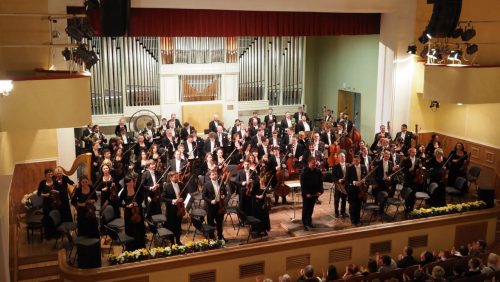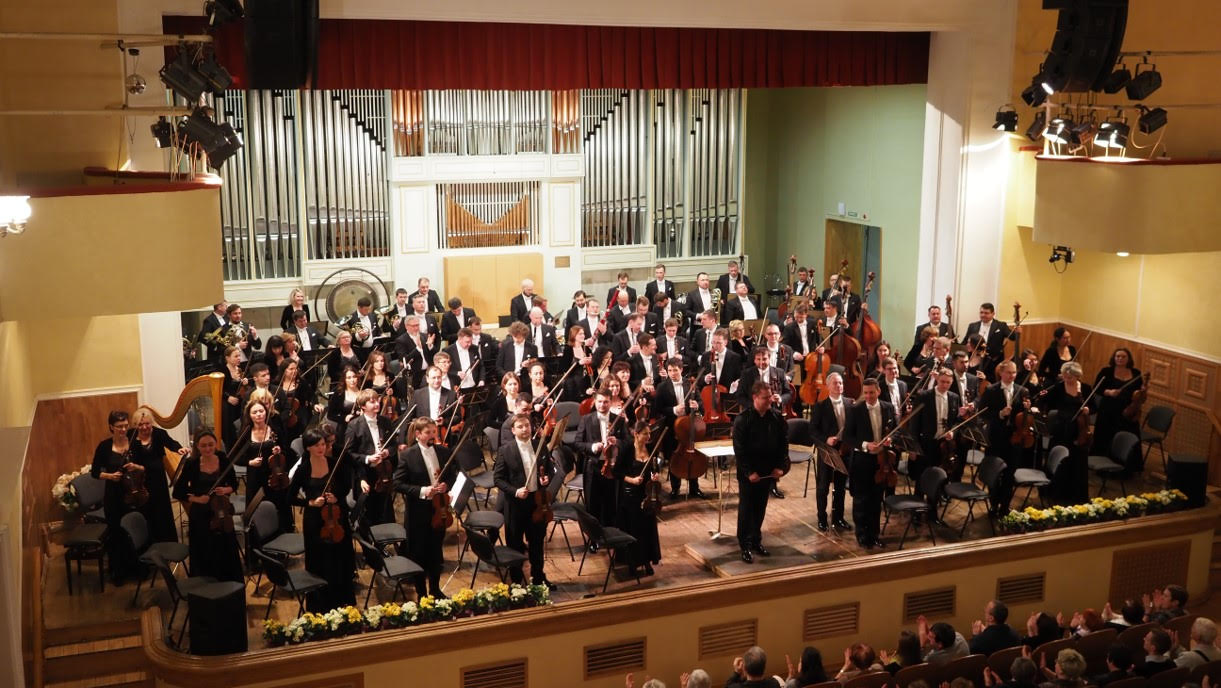 Russian Federation Mahler: Tatarstan National Symphony Orchestra / Alexander Sladkovsky (conductor), Yaroslavl Philharmonic Hall, 12.11.2019. (GT)
Russian Federation Mahler: Tatarstan National Symphony Orchestra / Alexander Sladkovsky (conductor), Yaroslavl Philharmonic Hall, 12.11.2019. (GT)

Mahler – Symphony No.5
The north Russian city of Yaroslavl lies on the confluence of the Volga and the Kotorosl rivers and being part of the Golden Ring of ancient Russian Towns is a UNESCO world heritage site. The population is of Scandinavian/Slavic descent and it was an important town during the struggle against the Mongol hordes. It boasts many colourful old Russian churches and three universities with thriving industries, particularly in the oil sector. The first woman to go into space Valentina Tereshkova was born and brought up here. It is the birthplace of the great tenor Leonid Sobinov – the music school in the city is named after him – and a museum is in his honour. The singer is also remembered by a fine sculpture across from the Philharmonic Concert Hall. The hall has a great organ and portraits of the great composers decorate its walls and has a fine acoustic. Naturally, for this premiere visit by the Tatarstan National Symphony Orchestra, the venue was packed by an audience full of musicians and students. The city has its own professional orchestra, which was founded in 1937, and the concert season enjoys visits by other choirs, and orchestras of the Russian Federation supported by the Ministry of Culture.
Attending the rehearsal, I was interested that – in the absence of the conductor – the orchestra themselves went through some of the passages of the symphony where they themselves thought attention should be given. This was led by the orchestra leader Alina Yakonina who in pointing out correct phrasing for the brass section, in particular, showed her responsibility as leader and principal violin. A nice touch to the beginning of the concert was the appearance of a lady on stage who introduced the performers and the symphony which was to be performed – a tradition in Russia which goes back many years when a musicologist would give a brief lecture on the music to be played.
The reading was little or no different from what I heard from the previous evening. Once more Max Anikin opened up on solo trumpet superbly – and in this smaller hall – the sudden attack by the violins seemed particularly loud with the great eruption of the funeral march. On this occasion, Sladkovsky was more demonstrative by frequently vocalising and at times almost dancing on the podium. Throughout there were terrific switches in dynamics, exciting playing, and the woodwind were eloquent with especially fine playing from the flute in the lamenting second idea. In the second movement, in the sudden ferocious strings’ attack, there was superb clarinet articulation by Artur Muchamedzhin. The adopted speed by Sladkovsky seemed to emphasise the emotional drama – a truly Russian manner – and here showing an affinity with Tchaikovsky and Rachmaninov’s late romanticism. Frequently the pace and clarity, matched with discipline, approached the intensity of Mravinsky’s Leningrad orchestra.
In the Scherzo, the woodwind and brass choruses were raucous with little compensation for the small hall’s acoustics. This was immensely exciting playing; this orchestra plays as if it was their last performance – giving of their very best. In the Adagietto, the mood was from a different world – reflecting on the composer’s love for life – inwardly intense and more passionate than before. In the Rondo finale, the idiom changed and the opening from the horns, backed by the woodwind, offered hope for life where death had threatened. The final bars brought a roar of stormy applause, and a remarkable standing ovation.
The orchestra gave a superbly performed encore of Wagner’s Ride of the Valkyries with playing by the strings which was astonishingly precise and impassioned. For me its performance during the afternoon rehearsal was amazingly just a little bit better, this was old style Wagner – echt romantic, and I doubt if Bayreuth has heard a better performance. Finally, the evening closed to a standing ovation from all present at this unforgettable musical event.
Gregor Tassie
